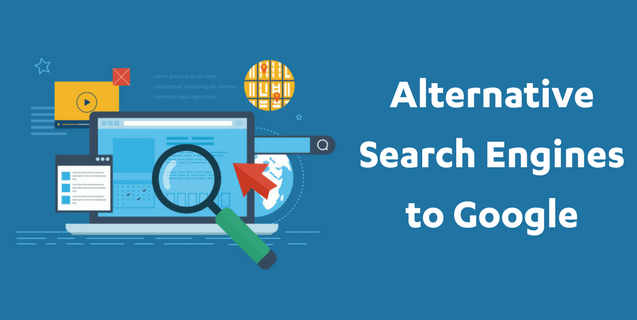25 Alternative Search Engines You Can Use Instead Of Google
For more than two decades, Google has been the world’s dominant search engine. Most of us rely on it daily for news, research, shopping, and general information. Because of this dominance, it has been the main focus of SEO and online marketing strategies.
But things have shifted in recent years. With the rise of AI-powered tools like ChatGPT, Bing Copilot, and Google’s Gemini (formerly Bard), users now have more choices than ever. While Google still holds the largest share of the market, a wide variety of alternative search engines offer distinct advantages—such as stronger privacy protections, unique indexing, specialized content, or different revenue models.
Below, you’ll find a list of 25 alternatives to Google, categorized by their strengths, along with their standout features.
Table of Contents
- AI-Powered Search Engines
- ChatGPT Search
- Google AI Mode
- Perplexity.ai
- You.com
- Revenue-Sharing Search Engine
- Yep.com
- Copyright-Free Search Engine
- Openverse
- Mainstream Search Engines
- Bing
- Yahoo
- Ecosia
- Privacy-Focused Search Engines
- KARMA Search
- DuckDuckGo
- Startpage
- Swisscows
- Brave Search
- Kagi
- Mojeek
- Knowledge-Based Search Engines
- X (formerly Twitter)
- SlideShare
- Wayback Machine
- Specialized Search Engines
- WolframAlpha
- International Search Engines
- Baidu
- Yandex
- Sogou
- Naver
- Overview Table
- FAQ
AI-Powered Search Engines
1. ChatGPT Search
Launched by OpenAI in 2024, ChatGPT Search is built into ChatGPT itself, offering real-time results with citations. It allows follow-up questions, contextual answers, and direct links to sources.
2. Google AI Mode
Introduced in 2025, Google’s AI Mode expands on AI Overviews, enabling deeper conversations, reasoning, and comparison-based queries. Available via Search Labs.
3. Perplexity.ai
A conversational search engine that directly answers questions while citing sources. Its interactive approach allows users to ask follow-up questions, making it more intuitive than traditional search engines.
4. You.com
Created by Richard Socher, You.com blends AI search with privacy controls. Users can choose between “personal mode” (customized results) and “private mode” (no tracking).
Revenue-Sharing Search Engine
5. Yep.com (by Ahrefs)
Yep.com shares 90% of ad revenue with content creators, offering a fairer ecosystem. It doesn’t build user profiles, making it privacy-friendly as well.
Copyright-Free Search Engine
6. Openverse
The go-to place for open-source media—images, audio, and video. Perfect for creators who need copyright-free content.
Mainstream Search Engines
7. Bing
Microsoft’s Bing integrates with Copilot, its AI-powered chatbot. Known for its visual search and rewards program.
8. Yahoo
Still a widely used portal combining search, email, finance, and news. Yahoo search results are powered by Bing.
9. Ecosia
A green search engine that uses ad revenue to plant trees worldwide. It’s a Bing-powered platform with a focus on sustainability.
Privacy-Focused Search Engines
10. KARMA Search
Donates 100% of its ad revenue to wildlife causes. Built on Brave’s privacy-first technology.
11. DuckDuckGo
Popular for its strict no-tracking policy. Provides anonymous search without targeted ads.
12. Startpage
Fetches Google results but strips out tracking, offering Google-quality results without privacy trade-offs.
13. Swisscows
Family-friendly and semantic search-based. Known for its privacy stance and AI-driven context understanding.
14. Brave Search
Independent, privacy-first, with its own search index. Also linked with the Brave browser ecosystem.
15. Kagi
A subscription-only ad-free engine that focuses on raw, unbiased results. Popular among researchers and journalists.
16. Mojeek
One of the few truly independent crawlers. Offers unfiltered results and prioritizes small sites.
Knowledge-Based Search Engines
17. X (formerly Twitter)
Ideal for real-time updates, news, and discussions.
18. SlideShare
A platform for presentations, slides, and documents. Great for business research.
19. Wayback Machine
Part of the Internet Archive. Lets you search historical versions of websites and access millions of archived resources.
Specialized Search Engines
20. WolframAlpha
A computational knowledge engine that calculates answers instead of indexing web pages. Useful for math, data, and scientific queries.
21. LinkedIn
Functions as a professional and business-focused search engine for people, companies, and opportunities.
International Search Engines
22. Baidu
The dominant search engine in China, offering web, maps, video, and app services.
23. Yandex
Russia’s largest search engine, also popular in surrounding countries. Known for its suite of tools.
24. Sogou
A Chinese engine integrating with WeChat and offering translation and AI-driven results.
25. Naver
South Korea’s most popular search engine, offering blogs, shopping, music, and localized content.
Overview Of Alternative Search Engines
| Search Engine | Index / Source | Category |
| ChatGPT Search | OpenAI | AI-powered |
| Perplexity.ai | Own AI tech | AI-powered |
| You.com | Bing + AI | AI-powered |
| Yep.com | Ahrefs tech | Revenue-sharing |
| Openverse | Open-source index | Copyright-free |
| Bing | Microsoft | Mainstream |
| Yahoo | Bing | Mainstream |
| Ecosia | Bing | Mainstream (eco) |
| DuckDuckGo | Bing + partners | Privacy |
| Startpage | Google (via proxy) | Privacy |
| Swisscows | Bing + own index | Privacy |
| Brave | Independent | Privacy |
| Kagi | Independent | Privacy (subscription) |
| Mojeek | Own crawler | Privacy |
| X (Twitter) | Own | Knowledge-based |
| SlideShare | Own | Knowledge-based |
| Wayback Machine | Internet Archive | Knowledge-based |
| WolframAlpha | Own | Specialized |
| Own | Specialized | |
| Baidu | Own | International (China) |
| Yandex | Own | International (Russia) |
| Sogou | Own | International (China) |
| Naver | Own | International (Korea) |
FAQ
Q1. How do I switch to an alternative search engine?
Change your browser’s default search settings to your preferred engine.
Q2. Which search engine is most popular?
Google remains dominant with ~90% global share, but Bing, Baidu, and Yandex lead in their respective regions.
Q3. What is the best Google alternative?
It depends on your needs. For AI-powered answers → Perplexity.ai/ChatGPT Search.
Q4. Is DuckDuckGo owned by Google?
No. DuckDuckGo is an independent company founded in 2008.
Q5. Which search engine is most unbiased?
Brave and Mojeek aim for neutrality by avoiding personalization. Startpage offers Google results without filters.
Q6. How do private search engines make money?
Mostly through contextual ads, affiliate links, subscriptions, or donations—without user profiling.
The Takeaway
While Google is still the global leader, exploring alternative search engines can give you better privacy, sustainability benefits, or AI-enhanced experiences. The best choice depends on your priorities—privacy, independence, accuracy, or innovation.
Boost Your SEO with the 1000 Social Bookmarking Sites List
Using the 1000 Social Bookmarking Sites List is a powerful way to improve your website’s SEO and increase online visibility. Social bookmarking allows you to share and organize web links across popular platforms, which helps in driving traffic and enhancing your site’s search engine ranking. By utilizing this extensive list, you can target diverse audiences, gain high-quality backlinks, and promote your content effectively. Regularly submitting your links to social bookmarking sites ensures that your content stays fresh and accessible, giving you a competitive edge in the digital landscape.





